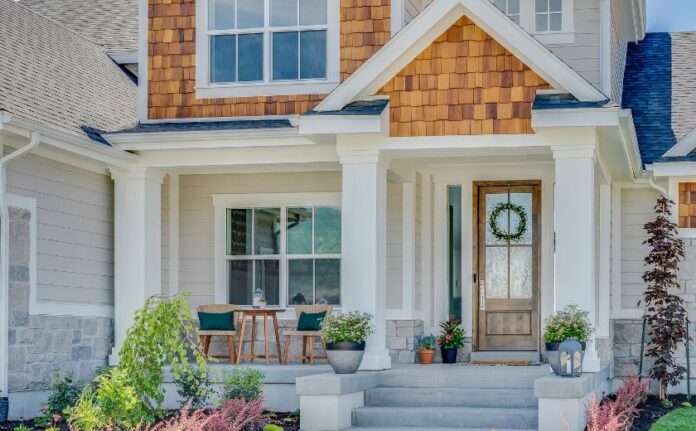Home security is a top priority for homeowners, and one of the most crucial aspects of safeguarding your property is securing entry points. From doors and windows to garage entries and other access points, a well-rounded approach to home security can significantly reduce the risk of break-ins and enhance your overall safety. This comprehensive guide will walk you through essential steps and strategies for securing your home’s entry points effectively.
1. Reinforce Doors and Frames
The front door is the primary entry point for most homes, making it a key focus in your security strategy. Start by ensuring your door is solid and made of sturdy materials like steel or solid wood. Hollow-core doors are more vulnerable to forced entry. Reinforcing the door frame with a metal plate or a door jamb reinforcement kit can also make a significant difference.
Install a high-quality deadbolt lock with a long bolt that extends deep into the door frame. Consider using a lock that is resistant to picking and bumping. Additionally, add a peephole or a smart doorbell camera so you can see who is at the door before opening it.
2. Upgrade Window Locks
Windows are another common entry point for burglars. Ensure all windows are equipped with secure locks. Replace any old or flimsy locks with more robust, modern options. For added security, consider installing window bars or grilles on ground-level windows or those that are easily accessible.
You can also use window sensors or alarms that will alert you if a window is opened or tampered with. Another effective measure is to apply window film or security laminate, which makes the glass more resistant to shattering.
3. Secure Sliding Glass Doors
Sliding glass doors are often targeted because they can be easier to bypass. Strengthen the security of these doors by installing a sliding door lock or bar. Ensure the track is well-maintained and consider using a security film or metal bars to reinforce the glass.
For added security, you can install a secondary locking mechanism that prevents the door from being lifted out of its track. Additionally, a security camera focused on the sliding door area can provide an extra layer of surveillance.
4. Enhance Garage Security
Garages can often be a vulnerable point in your home’s security, providing relatively easy access to your home or vehicles. To strengthen your garage’s security, begin by ensuring that the garage door is fitted with a robust, high-quality opener and a manual lock for added protection. If your current garage door opener is outdated, consider upgrading to a modern model equipped with rolling code technology to thwart potential code theft.
Additionally, installing a garage door security system or alarm can alert you to any unauthorized entry attempts. Make sure the door connecting the garage to the house is also secure, with a solid core construction and a high-quality lock. For those in Utah, if you encounter any issues with your garage door, professional garage door repair services are available to help ensure your system is in top working condition.
5. Improve Lighting and Visibility
Burglars prefer to work in the dark, so enhancing your home’s exterior lighting can deter potential intruders. Install motion-activated lights around key entry points such as doors, windows, and garages. Ensure these lights are bright enough to illuminate the area and remove any potential hiding spots.
In addition to motion-activated lights, consider using timed lighting to simulate activity when you are away from home. This can give the impression that someone is home and discourage burglars from targeting your property.
6. Install a Security System
A comprehensive home security system can provide peace of mind and an additional layer of protection. Look for systems that include door and window sensors, motion detectors, and surveillance cameras. Many modern systems offer smart home integration, allowing you to monitor and control your security system remotely from your smartphone.
Make sure to place security system signs and stickers around your property, as these can act as a deterrent to potential intruders. Additionally, regular maintenance and testing of your security system are essential to ensure it is functioning correctly.
7. Use Landscaping to Your Advantage
Landscaping can play a role in enhancing your home’s security. Keep bushes and trees trimmed, especially near windows and entry points, to eliminate potential hiding spots for burglars. Use thorny or dense plants around vulnerable areas to create a natural barrier.
Consider installing motion-activated sprinklers or other deterrents that can startle and discourage intruders. Proper landscaping not only improves the aesthetic appeal of your home but also contributes to a more secure environment.
8. Educate Your Family
Lastly, ensure that everyone in your household is aware of your home security measures and understands how to use them properly. Establish protocols for securing doors and windows, handling suspicious activity, and responding to alarms. Regularly review and practice your home security plan to keep everyone prepared.
In Conclusion
Securing your home’s entry points is a fundamental step in protecting your property and ensuring the safety of your family. By reinforcing doors and windows, upgrading locks, enhancing garage security, and incorporating effective lighting and security systems, you can significantly reduce the risk of break-ins. Remember, a well-secured home not only deters burglars but also provides peace of mind, allowing you to enjoy your home with confidence.




